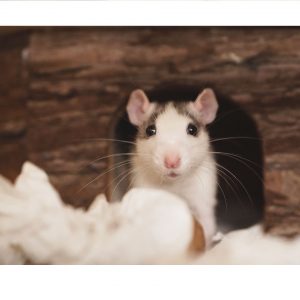Rex rats are undoubtedly among the most sought-after pet rats. Due to their adorable appearance, kinked fur, and curly whiskers, they make lovely pets!
Moreover, they are easy to care for and fun to be around. But if you intend to keep Rex rats as pets, knowing more about them is essential.
Lucky for you, this article will cover everything there is to know about Rex rats.
Rex rats are a subspecies of fancy rats distinguished by their curly coats. The coat is curly and shorter than usual. Both sexes have this short, wavy, and curly coat, while the males’ coats tend to be more defined and attractive. However, males also tend to have more thinning hair and bald patches.
Curled whiskers complement the lovely little creatures’ naturally curly fur.
Today, Rex rats stand among the most popular breeds of fancy rats worldwide. However, although Rex rats are extremely popular as pets, not many people are familiar with them.
To find out more about Rex rats, stick around till the end!
What Exactly Are Rex Rats?
The Rex Rat is a subspecies of the more common Fancy Rat, and it is named for its distinctively curly fur. Their coats are frizzier and shorter than the most common types of rats.
The Rex rat was created in 1976 when an English scientist named Roy Robinson began breeding the species.
That year, the National Fancy Rat Society established breed standards for them, paving the way for their global dissemination. People started adopting Rexes rapidly in the United States soon after they arrived.
The public saw two Rexes for the first time on October 8, 1983, when Mary Sheridan displayed them.
Shortly after this exhibition, the first three English Rex rats arrived in the United States in November 1983.
One was a Black Berkshire Rex, another was a Black Shelf Rex, and the third was a Cinnamon Rex.
These original Rexes were paired with other rats to produce some magnificent Rex creatures with more observable features.
The popularity of rex rats has only grown over time. Their unusual appearance has contributed to their popularity.
The Distinct Characteristics Of Rex Rats
The species’ most recognizable trait is the Rex rat’s signature wavy, curly fur. Besides this, you can easily distinguish them due to their unique physical appearance and friendly behavior.
Let’s go through some of the most distinctive characteristics of a Rex rat:
Physical Appearance
Although a Rex rat’s coat can vary greatly, it is typically tight and dense. Children and adults alike adore them because of this.
Plus, they enjoy being handled and are warm and cuddly. A wave in the coat is another common trait among Rex rats.
This wave can range from the slightest ripple to almost a corkscrew-like effect.
Some of the ones with thicker coats can even pass for miniature lambs. Know that a newborn Rex rat’s tight and dense coat will shed during the initial 6 to 7 weeks.
So your little pet won’t have the same fur as a full-grown adult.
Their adult coats gradually become thicker and tighter, and the curls typically loosen up again as they age. As a result, many of them develop bald spots.
The fur of a Rex rat can be any of the standard rat colors—blue, black, brown, cinnamon, etc. In addition, their eyes can be either red or black.

Long, curling whiskers are another unique characteristic of Rex rats.
Those twitching whiskers are irresistible, and this is one of the many aesthetic features that attract most owners.
Temperament And Behavioral Traits
The Rex rat is a very friendly, curious, and inquisitive creature.
They form deep friendships with humans, rats, and even occasionally with members of other species.
It’s also common for rats to retain their names and the tone of their owner’s voices. Regarding intelligence, rats are up there with some of the most advanced species on Earth.
So it naturally means that Rex rats have an incredible capacity for learning new skills. It may come as a surprise, but Rex rats are very hygienic.
You can train them to use a litterbox instead of soiling the floor of their cage. Cage cleaning can be less of a nuisance if you begin training them early.
Because their brains are designed similarly to ours, all rats exhibit remarkable levels of empathy.
Therefore, you and your rat will likely form a strong friendship because of the many similarities between the two.
Once you gain their trust, they will remain loyal to you forever. Due to their mild temperament, Rex rats are ideal as starter pets.
Some parents might balk at the idea, but they are safer pets for children than more common rodents like guinea pigs or hamsters.
However, never leave a Rex rat unattended for extended periods. They crave recognition, even among their kind.
Like regular pet rats, Rex rats are very social and need attention and time outside their cage.
Reserving playtime outside their cage is usually a good idea. Here’s a list of 9 games you can play with your lovable Rex rats!
Why Do Rex Rats Have Curly Hair?
The Rex rat is easily identifiable by its distinctive, curly hair. Articles about curly-coated rats date back to at least the 1930s.
Numerous genes are responsible for the slightly harsh and bouncy curl we are so used to seeing.
The color and firmness of these rats with curly hair can vary greatly. Baby Rex rats have more curls than any other kind.
By the time they’re five weeks old, your Rexes will have grown a beautiful, rich, curly coat; however, Rex rats “molt” between six and seven weeks.
To “molt” is to shed one’s coat of fur, either partially or whole, so that a new one can grow.
You’ll note that the curl mostly disappears after the fresh coat grows. However, when a male receives his second coat, he gets these magnificent curls every once in a while.
This beautiful coat of curls can help to show and enhance breeding lines.
Are Rex Rats Hypoallergenic?
Unfortunately, Rex rats are not hypoallergenic animals. As a result, people frequently become itchy when handling them.
Simply put, you won’t find any breed of completely allergen-free rodents.
For example, it’s common for people to have an allergic reaction if their nails leave tiny scratches on their skin.
In addition, most warm-blooded animals with fur, hair, or feathers can trigger allergic reactions at home or in the office.
Sadly, this includes most guinea pigs, mice, rats, hamsters, and, of course, Rex rats!
Yet the vast majority of allergic reactions are relatively moderate. You can easily manage these adverse allergic reactions by taking a simple antihistamine or avoid them by simply dressing in long sleeves.
The best way to determine if you can keep them as pets despite general allergies is to spend time with someone else’s Rex rat.
You can also visit the pet shop and try to spend some time with them to check for any allergic reactions.
And if you’re wondering if it’s safe and right to get a pet rat from a store, do check out this article.
Please don’t try to keep rats if you’ve ever had severe skin or breathing reactions to them. It’s bad for the rats and bad for you.
Are Rex Rats Rare?
You often see Rex rats at pet stores even if you don’t live near reputable breeders. This breed isn’t that uncommon and is quite popular worldwide as pets.
When you breed a Rex rat with another rat species, almost half of the offspring will also carry the Rex gene.
As a result, reproducing the Rex species is a breeze. Additionally, Rex rat breeding often results in breeders’ having too many Rexes on their hands.
There are many extras as they keep searching for the best specimens due to the rarity of high-quality Rexes.
As a result, you can obtain the rejected rats for pennies on the dollar. So Rex rats are widespread, and you can get them quite quickly.
How Much Do Rex Rats Cost, And How Can You Purchase Them?
A Rex rat might cost anywhere from $20 to $50, depending on where you get it. Some breeders provide discounts for adopting numerous animals, and others won’t sell to you unless you buy at least two.
Lucky for us, even rare rat varieties are reasonably priced.

Breeders will sometimes base their asking price on the uncommonness of a specific hue or pattern.
There is a chance that you could adopt a bonded rat duo that has been abandoned or given up.
Such a move likely comes with a slew of supplies, making this a potentially lifesaving but hefty investment.
Always do it from a reputable breeder if you want to buy rats.
You’ll have a much better chance of finding a rat that’s not only healthy but also social and fun to have around.
Rexes are widely available, so you may get one at a pet store if you can’t locate a breeder in your area.
Fortunately, you won’t have to fret over breed-specific health issues with your Rex rats.
Rex Rat Colors And Patterns
So far, you should already know that Rex rats are primarily famous for their unique, curly fur. However, their signature fur can be of any share and degree of tightness.
The most common Rex rat coat colors include –
- White
- Black
- Cream
- Tan
- Gray
- Platinum
- Chocolate
- Fawn
- Lilac
- Champagne
- Mink
- Silver
Their coats can also have very distinctive and beautiful patterns. They include –
- Essex
- Hooded
- Berkshire
- Masked
- Irish
- English Irish
- Blaze
Differences Between Rex Rats And Common Pet Rats
While it may seem relatively minor, some significant differences exist between common pet rats and Rex rats.
Before getting the pet rat of your choice, thoroughly examining all the differences can help.
Some key differences between the two breeds include
- Coat Type: Perhaps the most critical difference between a Rex rat and a common pet rat is that Rex rats will have curly coats while the other will have them straight.
- Whiskers: Common pet rats have long, straight whiskers. However, a Rex rat will have very uniquely long and curly whiskers.
- Loss of fur: Rex rats will lose much of their hair and may even show bald spots as they grow old. Such is not the case for common pet rats.
Conclusion
The Rex rat is an excellent choice if you’re looking for an intelligent and curious pet with a beautiful curly coat. I have mentioned all there is to know about Rex rats in this article.
And if you’re still unsure if pet rats are the right fit for you, here are 7 Best Alternatives to Pet Rats (Different Sizes).
I hope this article will be helpful as you embark on this new journey with your pet. Thanks for reading!




